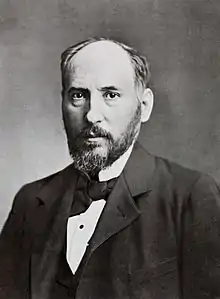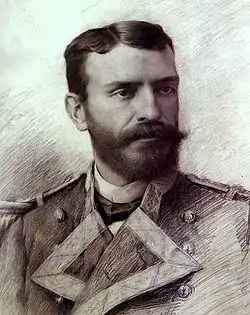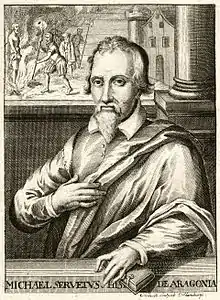List of Spanish inventors and discoverers
This is a list of inventors and discoverers who are of Spanish origin or otherwise reside in continental Spain or one of the country's oversees territories.
history|naturalists]] and anthropologists of the Americas.[1]
- Andrés Alcázar (1490-1585), neurosurgeon and anatomist, designed new tools for surgical treatments.[2]
- José María Algué (1856–1930), meteorologist, inventor of the barocyclometer, the nephoscope, and the microseismograph.[3][4]
- José Antonio de Artigas Sanz (b1887), created luminescence with noble gases.
- Jerónimo de Ayanz y Beaumont (1553–1613), registered design for steam-powered water pump for use in mines (1606).[5]
- Martín de Azpilicueta (1492–1586), economist, member of the School of Salamanca, precursor of the quantitative theory of money.[6]

Santiago Ramón y Cajal fathered modern neuroscience was the first person of Spanish origin to win the Nobel Prize in Physiology or Medicine (1906).
B
- Ignacio Barraquer (1884–1965), leading ophthalmologist, pioneer of cataract surgery.[7]
- José Ignacio Barraquer (1916–1998), leading ophthalmologist, father of modern refractive surgery, he invented the microkeratome and the cryolathe, developed the surgical procedures of keratomileusis and keratophakia.[8][9]
- Juan Pablo de Bonet (1573-1633), pioneer of education for the deaf, he published Reducción de las letras y arte para enseñar a hablar a los mudos ("Summary of the letters and the art of teaching speech to the mute") in 1620 in Madrid, the first modern treatise of sign language phonetics, setting out a method of oral education for deaf people and the first recognizable sign language alphabet.[10][11]
C

Pitcairn PCA-2 autogyro, build in the U.S. under Cierva license, 1961.
- Ángel Cabrera (1879–1960), naturalist, investigated the South-American fauna.[12]
- Nicolás Cabrera (1913–1989), physicist, did important work on the theories of crystal growth and the oxidisation of metals.[13][14]
- Celedonio Calatayud (1880-1931) pioneered the use of radiology and electrology in Europe for both diagnostics and therapeutical purposes, introducing radiotherapy in Spain in 1906.[15]
- Manuel Cardona Castro (1934-2014), physicist, researched superconductivity and the interaction of electromagnetic radiation with a semiconductor material.[16]
- Julio Cervera Baviera (1854-1927), engineer, pioneer in the development of radio, educator, explorer, and military man. He established the second and third regular radiotelegraph service in the history of the world in 1901 and 1902 by maintaining regular transmissions between Tarifa and Ceuta for three consecutive months, and between Javea and Ibiza. Some consider him the actual inventor of the radio.[17][18]
- Juan de la Cierva (1895–1936), aeronautical engineer, pioneer of rotary flight, inventor of the autogyro.[19]
- Juan Ignacio Cirac Sasturain (born 1965), one of the pioneers of the field of quantum computing and quantum information theory.[20]
- Josep Comas i Solà (1868–1937), astronomer, discovered the periodic comet 32P/Comas Solá and 11 asteroids, and in 1907 observed limb darkening of Saturn's moon Titan (the first evidence that the body had an atmosphere).[21]
- Avelino Corma Canós (born 1951), chemist, distinguished for his world-leading work on heterogeneous catalysis, developed catalysts that are being used commercially in several industrial processes.[22]
D
- Francisco Díaz de Alcalá (1527-1590), urologist and doctor, wrote the first treatises on diseases of the bladder, kidneys, and urethra; he is generally regarded as the founder of modern urology.[23]
- Pedro Duque (born 1963), astronaut and veteran of two space missions.[24]
E
- Fausto de Elhúyar (1755–1833), chemist, joint discoverer of tungsten with his brother Juan José de Elhúyar in 1783.[25]
F
G
- Manuel García (1805-1906) singer, music educator, and vocal pedagogue, inventor of the first laryngoscope.[28]
- Antoni de Gimbernat, (1734–1816), surgeon and anatomist, described in detail the anatomy of the inguinal and femoral regions of the human body and laid the groundwork for modern techniques of inguinal hernia repai. The lacunar ligament is named after him.[29][30]
- Alejandro Goicoechea Omar (1895-1984), engineer, worked for and co-founded Talgo company, where he developed the Talgo trains famous design.[31]
- Fernando Gallego Herrera, (1901-1973), civil engineer and aviator, noted for improved bridge design, an improved method for undersea tunnel construction, plans for the use of compressed air for vertical take off of aircraft in the 1930s, and the modernization of the Panama Canal.
H
- Francisco Hernández (1514–1587), botanicist, carried out important research about the Mexican flora.[32]
- Juan de Herrera (1530-1597), architect, mathematician and geometrician, designed the construction plans of El Escorial and the Cathedral of Valladolid among others and created a compass to measure length and width and a machine to cut iron.[33]
- Bartolomé Hidalgo Agüero (1530-1597), doctor, developed, described and evaluated a revolutionary healing method for stab wounds [34]
- Juan Huarte de San Juan (1529–1588), physician and psychologist, his Examen de ingenios para las ciencias was the first attempt to show the connexion between psychology and physiology.[35]
J
- Manuel Jalón Corominas (1925–2011), inventor of the mop (1956) and a worldwide used "two-piece" disposable syringe (1978).[36]
- Carlos Jiménez Díaz (1898–1967), doctor and researcher, leading figure in pathology.[37]
- Jerónimo de Ayanz y Beaumont (1553-1613), Inventor of the steam-powered water pump for draining mines and more than forty eight inventions.
L
- Rodrigo López de Segura (1540-1580), humanist and chess player, wrote one of the first definitive books about modern chess in Europe: Libro de la invencion liberal y arte del juego del axedrez.[38]
- Emilio Herrera Linares (1879-1967), military engineer and physicist, designed a pressurized space suit for stratospheric flights (escafandra estratonáutica), precedent of the modern space suits.[39]
- José Luis López Gómez (1941-) is an engineer and inventor. He made a number of inventions related to high speed trains.
M
- Gregorio Marañón (1887–1960), doctor and researcher, leading figure in endocrinology.[40]
- Narcís Monturiol (1818–1885), physicist and inventor, pioneer of underwater navigation and first machine powered submarine.[41][42]
- José Celestino Bruno Mutis (1732–1808), botanicist, doctor, philosopher and mathematician, carried out relevant research about the American flora, founded one of the first astronomic observatories in America (1762).[43]
- Aureliano Maestre de San Juan (1828-1890), scientist, histologist, physician and anatomist credited as being one of the first scientists to recognize the disorder known as Kallmann syndrome.[44]
O

Isaac Peral in 1918
- Severo Ochoa (1905–1993), doctor and biochemist, achieved the synthesis of ribonucleic acid (RNA), Nobel prize Laureate (1959).[45]
- Federico Olóriz Aguilera, (1855-1912), doctor, created the primary fingerprint classification system used in Portugal and Spain prior to the use of computer filing systems.[46]
- Mateu Orfila (1787–1853), doctor and chemist, father of modern toxicology, leading figure in forensic toxicology.[47]
- Joan Oró (1923–2004), biochemist, carried out important research about the origin of life, he worked with NASA on the Viking missions.[48]
P
- Julio Palacios Martínez (1891–1970), physicist and mathematician.[49]
- Isaac Peral (1851–1895), engineer and sailor, designer of the first fully operative military submarine. [50]
- Juan Tomás Porcell (1528-1580), doctor and anatomist, carried decisive research on the Black Death and wrote influential treaties of epidemiology.[51]
R
- Santiago Ramón y Cajal (1852–1934), father of Neuroscience, Nobel prize Laureate (1906).[52]
- Julio Rey Pastor (1888–1962), mathematician, leading figure in geometry.[53]
- Wifredo Ricart (1897–1974), engineer, designer and executive manager in the automotive industry.[54]
- Andrés Manuel del Río (1764–1849), geologist and chemist, discovered vanadium (as vanadinite) in 1801.[55]
- Pío del Río Hortega (1882–1945), neuroscientist, discoverer of the microglia or Hortega cell.[56]
- Félix Rodríguez de la Fuente (1928–1980), naturalist, leading figure in ornithology, ethology, ecology and science divulgation.[57]
- Ángela Ruiz Robles (1895-1975) teacher, writer and inventor, pioneer of the electronic book.[58]
S

Miguel Servet, the first European to correctly describe the function of pulmonary circulation, c. 1740
- Margarita Salas (born 1938), biochemist, molecular genetist and researcher.[59]
- Mónico Sánchez Moreno (1880-1961), electrical engineer, inventor and industrialist; early developer of high frequency electrical conduction equipment, mobile telephony, radiology, electrotherapy and inventor of the first portable X-ray machine in 1909.[60]
- Miguel Servet (1511–1553), scientist, surgeon and humanist; first European to describe pulmonary circulation.[61]
- Luis Simarro Lacabra (1851–1921), psychiatrist; developed a silver bromide modification of Camillo Golgi's silver chromate technique.[62]
T
- Esteban Terradas i Illa (1883–1950), mathematician, physicist and engineer.[63]
- Leonardo Torres Quevedo (1852–1936), engineer and mathematician, pioneer of automated calculation machines, inventor of the automatic chess, pioneer of remote control, designer of the funicular over the Niagara Falls.[64][65][66]
- Eduardo Torroja (1899–1961), civil engineer, structural architect, world-famous specialist in concrete structures.[67][68]
- Juanelo Turriano (1500-1585) Italo-Spanish clockmaker, engineer and mathematician, he built the Artificio de Juanelo, an engine that, driven by the river itself, lifted water from the Tagus to a height of almost 100 meters.[69]
- Josep Trueta (1897–1977), doctor, his new method for treatment of open wounds and fractures helped save a great number of lives during World War II.[70]
U
- Antonio de Ulloa (1716–1795), scientist, soldier and author; joint discoverer of element platinum with Jorge Juan y Santacilia (1713–1773).[71]
V
- Francisco Vallés (1524-1592), physician, regarded as the founder of modern anatomical pathology.[72]
- Joseph de la Vega (1650–1692), businessman, wrote Confusion of Confusions (1688), first book on stock markets.[73]
- Arnold of Villanova (c. 1235–1311), alchemist and physician, he discovered carbon monoxide and pure alcohol.[74][75]
- Francisco de Vitoria (c. 1480/86 – 1546), member of the School of Salamanca, precursor of international law theory.[76]
See also
References
- Corsini, Raymond J. (2002). The dictionary of psychology. Psychology Press. p. 10. ISBN 978-1-58391-328-4. Retrieved 14 March 2012.
- "Andres Alcazar, neurocirujano del Renacimiento".
- Walsh, James J. Science in the Philippines, New York.
- Warren, James Francis (2009). "Scientific Superman: Father José Algué, Jesuit Meteorology, and the Philippines under American Rule, 1897-1924." In Colonial Crucible: Empire in the Making of the Modern American State, Part VIII, University of Wisconsin Press.
- Garcia, Nicholas (2007). Mas alla de la Leyenda Negra. Valencia: Universidad de Valencia. pp. 443–454. ISBN 9788437067919.
-
- Giraud, Bibli. Sacr., II 334-336 (gives list of his writings)
- whonamedit.com
- American Society of Cataract and Refractive Surgery
- PubMed Central
- Pablo Bonet, J. de (1620) Reduction de las letras y Arte para enseñar á ablar los Mudos. Ed. Abarca de Angulo, Madrid, ejemplar facsímil accesible en la , online (spanish) scan of book, held at University of Sevilla, Spain
- http://global.britannica.com/EBchecked/topic/72993/Juan-Pablo-Bonet
- Biography Archived 2005-05-03 at the Wayback Machine (in Spanish)
- Remembering Cabrera
- Journal of Physics
- Spanish National Library - La Esfera, December 28, 1918
- Enciclopedia Microsoft Encarta Online 2009. "Manuel Cardona Castro". Archived from the original on 12 March 2008. Retrieved 17 September 2009.
- "- EL MUNDO | Suplemento cronica 524 - EL ESPAÑOL QUE INVENTO LA RADIO".
- "Radio Officers | from Spain R/O Arturo RECIO sent a piece of the RADIO history…a new despute??".
- "Vector Flight". Archived from the original on 2012-02-05. Retrieved 2014-04-18.
- BBVA Foundation Frontiers of Knowledge Awards
- Baedeker's Barcelona Peter M. Nahm, Automobile Association (Great Britain) - 1992 "Josep Comas i Solà (1868–1937) Born in Barcelona, Josep Comas i Sola soon made his mark as an astronomer; he was only fifteen when he published an article in a French specialist magazine. "
- "Corma, el químico español de las 100 patentes". RTVE.es. RTVE. 2014-05-28. Retrieved 29 October 2014.
- http://global.britannica.com/EBchecked/topic/161908/Francisco-Diaz
- "El Astronauta e Ingeniero Aeronáutico Pedro Duque "ficha" por su Escuela". 2004-10-21. Archived from the original on 2004-12-08. Retrieved 2005-04-28. (in Spanish)
- Schufle, Joseph A. (1975). "Juan Jose D'Elhuyar, Discoverer of Tungsten". Journal of Chemical Education. 52 (5): 325. doi:10.1021/ed052p325.1.
- (in Spanish) Javier Manterola Armisén (1988). <<Carlos Fernández Casado. Hombre y conocimiento>>. Revista de Obras Públicas nº 135, pp. 1013-1026.
- P. FAUS SEVILLA, El cólera de 1885 en Valencia y la vacunación Ferrán, en Medicina y Sociedad en la España del s. XIX, Madrid 1964, 285-486. (in Spanish)
- García, Manuel (1855). "Observations on the Human Voice". Proceedings of the Royal Society of London. 7: 399–410. doi:10.1098/rspl.1854.0094. JSTOR 111815. PMC 5180321. Retrieved 28 August 2010.
- Arráez-Aybar, LA & Bueno-López, JL. (2013). Antonio Gimbernat y Arbós: An Anatomist-surgeon of the Enlightenment (In the 220th Anniversary of his ‘‘A New Method of Operating the Crural Hernia’’). Clinical Anatomy 26:800–809
- Antonio de Gimbernat y Arbós (1734–1816). Sociedad Hispanoamericana de Hernia
- http://www.euskomedia.org/aunamendi/66653
- Acuna-Soto, Rodolfo; Stahle, David W.; Cleaveland, Malcolm K.; Therrell, Matthew D. (October–December 2002). "Megadrought and Megadeath in 16th Century Mexico" (PDF). Revista Biomédica. 13 (4): 282–289. doi:10.1111/j.1931-0846.2006.tb00273.x. ISSN 0188-493X. PMC 2730237. PMID 11971767. Retrieved September 7, 2012.
Summary. The native population collapse in 16th century Mexico was a demographic catastrophe with one of the highest death rates in history. Recently developed tree-ring evidence has allowed the levels of precipitation to be reconstructed for north central Mexico, adding to the growing body of epidemiologic evidence and indicating that the 1545 and 1576 epidemics of cocoliztli (Nahuatl for "pest") were indigenous hemorrhagic fevers transmitted by rodent hosts and aggravated by extreme drought conditions.
Alt URL - http://global.britannica.com/EBchecked/topic/263711/Juan-de-Herrera
- http://www.jameslindlibrary.org/illustrating/articles/bartolome-hidalgo-de-agueros-16th-century-evidence-based-challz%5B%5D
- "Huaraz - 1911 Encyclopedia Britannica - Bible Encyclopedia".
- got Spanish women off their knees has died
- Viviane Quirke, Judy Slinn, Perspectives on Twentieth-century Pharmaceuticals (2010), p. 94.
- Ruy López de Segura, Libro de la invención liberal y arte del juego del ajedrez..., Alcalá de Henares, Andrés de Angulo, 1561. Ficha en la Biblioteca Digital Hispánica de la BNE.
- "Encyclopedia Astronautica Index: 1". Archived from the original on 2013-05-22. Retrieved 2013-06-19.
- (in Spanish) biography
- Cargill Hall, R. (1986). History of rocketry and astronautics: proceedings of the third through the sixth History Symposia of the International Academy of Astronautics, Volumen 1. NASA conference publication. American Astronautical Society by Univelt, p. 85. ISBN 0-87703-260-2
- A steam powered submarine: the Ictíneo Low-tech Magazine, 24 August 2008
- "Jose Celestino Mutis". Retrieved 3 April 2013.
- Maestre de San Juan, Aureliano (1856). "Teratolagia: falta total de los nervios olfactorios con anosmia en un individuo en quien existia una atrofia congenita de los testiculos y miembro viril". El Siglo Médico. 3: 211–221.
- Nobelprize.org. "The Nobel Prize in Physiology or Medicine 1959".
- http://www.fprints.nwlean.net/o.htm
- "Biography of Mathieu Joseph Bonaventure Orfila (1787–1853)". U.S. National Library of Medicine.
- Michael Mark Woolfson, Time, Space, Stars & Man: The Story of the Big Bang. World Scientific; 2013. ISBN 978-1-84816-933-3. p. 383.
- Armando Duran « Julio Palacios- En el centenario del nacimiento del fisico espanol » El Pais, 14 abril 1991 (in Spanish)
- Humble 1981, p. 174.
- "Porcell, Juan Tomás - Página de voz - Gran Enciclopedia Aragonesa OnLine".
- "History of Neuroscience". Society for Neuroscience. Retrieved 2008-10-09.
- Link to the Spanish Council of Scientific Research (CSIC): http://www.residencia.csic.es/jae/en/protagonistas/41_c.htm
- Eric Dymock, "Postwar sports cars. The modern classics".
- Cintas, Pedro (2004). "The Road to Chemical Names and Eponyms: Discovery, Priority, and Credit". Angewandte Chemie International Edition. 43 (44): 5888–94. doi:10.1002/anie.200330074. PMID 15376297.
- "Pio del Rio Hortega". Encyclopædia Britannica. Retrieved 18 December 2012.
- El impresionante mundo de Félix Rodríguez de la Fuente 14 December 2008 20 minutos (in Spanish)
- Gaceta de la Actualidad Técnica. Year II, No. 14, September 1955
- "Prof. Margarita Salas Falgueras". sibi.org. Archived from the original on 24 July 2011. Retrieved 9 August 2010.
- Ansede, Manuel (19 May 2013). "El niño pobre que desarrolló teléfonos móviles hace un siglo". Retrieved 3 June 2013.
- 2011 "The love for truth. Life and work of Michael Servetus", (El amor a la verdad. Vida y obra de Miguel Servet.), printed by Navarro y Navarro, Zaragoza, collaboration with the Government of Navarra, Department of Institutional Relations and Education of the Government of Navarra, 607 pp, 64 of them illustrations, p 215-228 & 62nd illustration (XLVII)
- "Legado L.Simarro".
- Esteban Terrades, A life given to science and technology Archived 2005-04-20 at the Wayback Machine
- "Milestones:Early Developments in Remote-Control, 1901 - GHN: IEEE Global History Network". Ieeeghn.org. 2007-03-15. Retrieved 2013-01-02.
- Randell, Brian. "From Analytical Engine to Electronic Digital Computer: The Contributions of Ludgate, Torres, and Bush" (PDF). Archived from the original (PDF) on September 21, 2013. Retrieved September 9, 2013.
- Torres and his remarkable automatic devices. Issue 2079 of Scientific American, 1915
- Troyano, Leonardo, '"Bridge Engineering: A Global Perspective"', Thomas Telford Publishing, 2003, p.650
- water tower in Fedala
- The new model of the hydraulic machine known as El Artificio de Juanelo in three-dimensional computer simulation
- Pérez, Fariña L A (March 2008). "[Studies on the kidney and the renal circulation, by Josep Trueta i Raspall (1897-1977)]". Actas Urologicas Españolas. 32 (3): 276–80. doi:10.1016/S0210-4806(08)73831-2. ISSN 0210-4806. PMID 18512383.
- Weeks, M. E. (1968). Discovery of the Elements (7 ed.). Journal of Chemical Education. pp. 385–407. ISBN 978-0-8486-8579-9. OCLC 23991202.
- "Doctoral School - UAH - School Director".
- It is possible to read it in a full view mode here or buy here Archived 2014-03-29 at the Wayback Machine.
- Fernando Salmón (2010). Robert E. Bjork (ed.). The Oxford Dictionary of the Middle Ages. Oxford, England: Oxford University Press. p. 135. ISBN 978-0-19-866262-4.
- D. Campbell, Arabian Medicine and Its Influence on the Middle Ages, p. 5.
- Pagden, Anthony (1991). Vitoria: Political Writings (Cambridge Texts in the History of Political Thought). UK: Cambridge University Press. p. xvi. ISBN 978-0-521-36714-1.
This article is issued from Wikipedia. The text is licensed under Creative Commons - Attribution - Sharealike. Additional terms may apply for the media files.